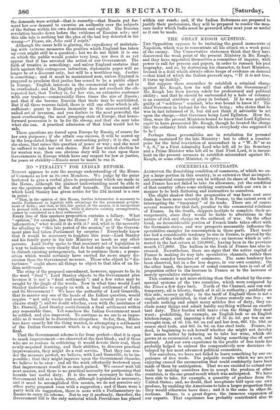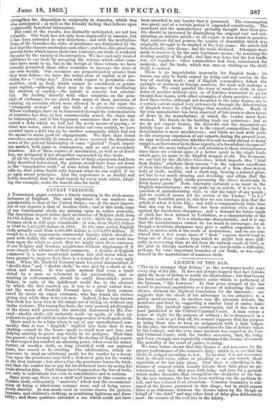COMMERCIAL CONTRASTS.
ALTHOUGH the flourishing condition of commerce, of which we en- joy a large portion in this country, is so extensive that no import- ant commercial community can be without its share of the benefit, and France has not failed to take its allowance, yet the condition of that country offers some striking contrasts with our own in a manner to be both flattering and instructive to ourselves.
The slight shadow that the prognostics of war have cast over trade has been more severely felt in France, to the extent even of interrupting the " buoyancy " of its trade. There are of course several reasons for that fact, peculiar to the commercial relations of France. In the South, shippers hesitate to complete their ar- rangements, since they would be liable to alterations in- the nature of risk and charge on the outbreak of war. On the other hand, no inconsiderable portion of French trade takes effect with the Germanic states, and war prospects necessarily influence the speculative energies for consumption in those parts. That trade has had a considerable tendency to rise in France, is proved by the increase of the traffic on the railways ; an increase which is esti- mated in the last return at 256,000/., having been in the previous month 177,0001. The bullion in the Bank of France has also in- creased. Nevertheless, there are signs that the active capital of France is making its way into speculative channels, rather than into the sounder branches of commerce. The same tendency has been observed, but in a far less degree, in our own country. On the other hand, the increase of sound commerce here is out of all proportion either to the increase in France or to the increase of merely speculative enterprise.
This contrast is not more striking than that afforded by the com- mercial systems of the two countries, which were compared by the Times a few days back. North of the Channel, said our con- temporary, all is liberty, South of it all is authority; publicity on this side, secrecy on that ; in the tariff of England there is not a single article prohibited, in that of France scarcely one free ; we exclude nothing and admit many articles free of duty, they ex- clude many things and admit hardly anything without an exorbi- tant duty. They burden with taxes even the things they most want ; prohibiting, for example, an English lock or an English kitchen-range, and imposing a duty of 31. 2s. 6d. per ton on un- wrought iron, of 6/. 13s. 6d. on rod and bar iron, 60/. 12s. 10d. on coarse steel tools, and 861. 5s. 8d. on fine steel tools. France, in- deed, is beginning to ask herself whether she might not develop her means better by inducing us to take her wine, which she grows at so economical a cost, and taking something else of ours instead. And our own experience in the profits of free trade has probably helped to enforce the comparatively new doctrines de- veloped by her most advanced political economists. For ourselves, we have not failed to learn something by our ex- perience of free trade. The palpable results which we are now enjoying exceed the enumeration that could confidently have been made of them by anticipation. That we are enabled to extend our trade by making ourselves free to accept the produce of other countries, is the one grand result which was anticipated. We have been able to take, for example, a quantity of produce from the United States; and, no doubt, that acceptance told upon our own produce, by enabling the Americans to take a larger proportion than they would otherwise have done ; and it is the same in other di- rections. Hence, in a great degree, the immense expansion of our exports. That experience has probably contributed also to strengthen the disposition to reciprocity. in America, which was also anticipated ; as well as the friendly feeling that follows upon reciprocally beneficial intercourse. But some of the results, less distinctly anticipated, are not less valuable. Our trade has not only been augmented in amount, but it has been extended in new directions ; and with the multiplica- tions of the branches the risks of mischance are diminished by the fact that the chances neutralize each other ; and thus, like great com- mercial firms which insure their own ventures, our trade is rendered the safer by the variety of its enterprises. We have not only created additions to our trade by accepting the returns which other coun- tries have made to us, but in the receipt of those returns we have actually permitted those other countries to increase the store of our own wealth. Our resources are proportionately greater than they were before—we have the better store of capital or of pro- vision for a " rainy day." Even with regard to perishable com- modities, such as food, which cannot be considered as perma- nent capital,—although they may be the means of facilitating the creation of capital,—the benefit is scarcely less substan- tial. By dealing directly with other countries on the prin- ciple of exchange, we are saved from many of those processes of running up accounts which were allowed to go so far upon the "triangular system" and the faith of a circuitous exchange. Where exchanges have to be transacted through the intermediation of countries less free, or less commercially sound, the chain may be interrupted ; and it has happened sometimes that we have in- curred a debt which we had not the ready means of paying ; or what was worse, since it was less under our own control, we have counted upon a debt run up by another community which had not the means to make good its engagements. We have thus found ourselves unexpectedly in arrears, or have received the disastrous news of the general bankruptcy of some " glutted " South Ameri- can market, with panic in consequence, and no end of secondary disasters. All of these sources of uncertainty, as well as of direct loss, are mitigated if not altogether superseded by free trade. 11 all the benefits which are matters of daily experience had been fully described beforehand, the picture would have been set down as the "imaginative work" of some Adam Smith ; but experience tells us, that Adam Smith only foresaw what we can realize if we go upon sound principles. And the experience is so doubly and trebly beneficial, that we shall benefit by every state which, adopt- ing our example, seeks the benefit also for itself.



























 Previous page
Previous page